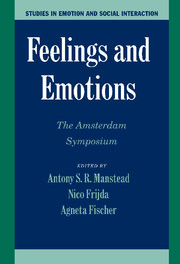Book contents
- Frontmatter
- Contents
- List of Contributors
- 1 Introduction
- PART I THE NATURE OF FEELINGS AND EMOTIONS
- PART II BASIC PSYCHOLOGICAL PROCESSES IN FEELINGS AND EMOTIONS
- PART III FEELINGS AND EMOTIONS: THE PLACE OF PLEASURE
- 14 The Affect System
- 15 Pleasure, Unfelt Affect, and Irrational Desire
- 16 Some Perspectives on Positive Feelings and Emotions
- 17 Pleasure, Utility, and Choice
- PART IV FEELINGS AND EMOTIONS IN THEIR SOCIOCULTURAL CONTEXT
- PART V FEELINGS, EMOTIONS, AND MORALITY
- Subject Index
- Author Index
- Plate section
- References
15 - Pleasure, Unfelt Affect, and Irrational Desire
Published online by Cambridge University Press: 05 June 2012
- Frontmatter
- Contents
- List of Contributors
- 1 Introduction
- PART I THE NATURE OF FEELINGS AND EMOTIONS
- PART II BASIC PSYCHOLOGICAL PROCESSES IN FEELINGS AND EMOTIONS
- PART III FEELINGS AND EMOTIONS: THE PLACE OF PLEASURE
- 14 The Affect System
- 15 Pleasure, Unfelt Affect, and Irrational Desire
- 16 Some Perspectives on Positive Feelings and Emotions
- 17 Pleasure, Utility, and Choice
- PART IV FEELINGS AND EMOTIONS IN THEIR SOCIOCULTURAL CONTEXT
- PART V FEELINGS, EMOTIONS, AND MORALITY
- Subject Index
- Author Index
- Plate section
- References
Summary
ABSTRACT
An example of unfelt affect is described in which subliminal facial expressions cause unfelt “liking,” which influences people's reactions and beverage consumption without causing conscious emotion. Subcortical brain modules for core processes of nonconscious “liking” and “wanting” have been revealed by affective neuroscience studies, based on behavioral affective reactions that occur even in creatures that cannot speak, such as infants or animals. Core “liking” and “wanting” may normally contribute to conscious pleasure and desire. But these core psychological processes are themselves intrinsically inaccessible and provide a basis for unconscious affective reactions. The process of “wanting” also provides insight into cases of truly irrational desire, where one wants what is neither liked nor expected to be liked.
Sweetness tastes nice. The pleasantness of a sweet taste is a gloss on the mere sensation, added by our brains to the sensory quality of sweetness (Frijda, 2001). Sweets need not be nice – there are nasty sweet tastes in this world too (as when aversions are acquired for particular sweet flavors). But humans are evolutionarily and neurobiologically predisposed to find sweet sensation pleasant. This chapter is devoted to the gloss of niceness, especially the niceness of sensory pleasures (for discussion of nonsensory pleasures, see Frijda, 2001). What is the niceness gloss? How is it added to a sweet sensation by brain systems? And how does it motivate real action – in rational and even irrational ways?
- Type
- Chapter
- Information
- Feelings and EmotionsThe Amsterdam Symposium, pp. 243 - 262Publisher: Cambridge University PressPrint publication year: 2004
References
- 13
- Cited by

